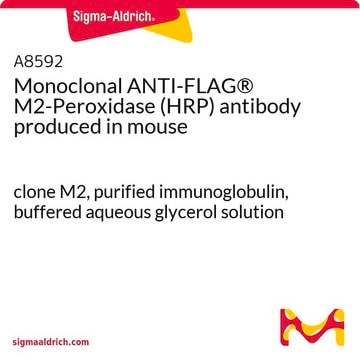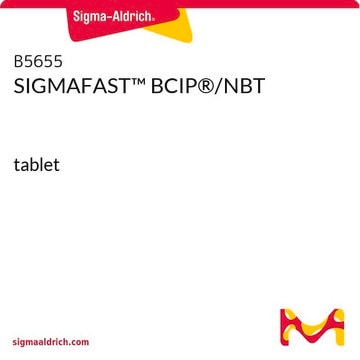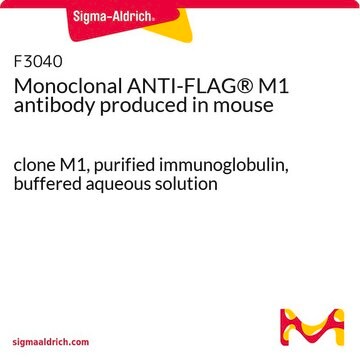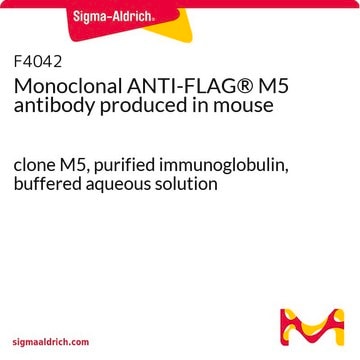A9469
Monoclonal ANTI-FLAG® M2-Alkaline Phosphatase antibody produced in mouse
clone M2, purified immunoglobulin, buffered aqueous glycerol solution
Szinonimák:
Monoclonal ANTI-FLAG® M2 antibody produced in mouse, Anti-ddddk, Anti-dykddddk
About This Item
Javasolt termékek
biológiai forrás
mouse
Minőségi szint
konjugátum
alkaline phosphatase conjugate
antitest forma
purified immunoglobulin
antitest terméktípus
primary antibodies
klón
M2, monoclonal
form
buffered aqueous glycerol solution
faj reaktivitás
all
koncentráció
~1 mg/mL
technika/technikák
indirect ELISA: 1:20,000
izotípus
IgG1
immunogén szekvencia
DYKDDDDK
kiszállítva
wet ice
tárolási hőmérséklet
−20°C
Géninformáció
human ... ALPL(249)
Looking for similar products? Látogasson el ide Útmutató a termékösszehasonlításhoz
Általános leírás
Alkalmazás
Western Blotting (1 paper)
- in direct tissue blot immunoassay of sweet orange petioles samples
- in screening internalization of delta opioid receptor
- for screening cell-free protein expression using ELISA
Fizikai forma
Jogi információk
Nem találja a megfelelő terméket?
Próbálja ki a Termékválasztó eszköz. eszközt
Tárolási osztály kódja
10 - Combustible liquids
WGK
WGK 3
Lobbanási pont (F)
Not applicable
Lobbanási pont (C)
Not applicable
Analitikai tanúsítványok (COA)
Analitikai tanúsítványok (COA) keresése a termék sarzs-/tételszámának megadásával. A sarzs- és tételszámok a termék címkéjén találhatók, a „Lot” vagy „Batch” szavak után.
Már rendelkezik ezzel a termékkel?
Az Ön által nemrégiben megvásárolt termékekre vonatkozó dokumentumokat a Dokumentumtárban találja.
Az ügyfelek ezeket is megtekintették
Tudóscsoportunk valamennyi kutatási területen rendelkezik tapasztalattal, beleértve az élettudományt, az anyagtudományt, a kémiai szintézist, a kromatográfiát, az analitikát és még sok más területet.
Lépjen kapcsolatba a szaktanácsadással

















